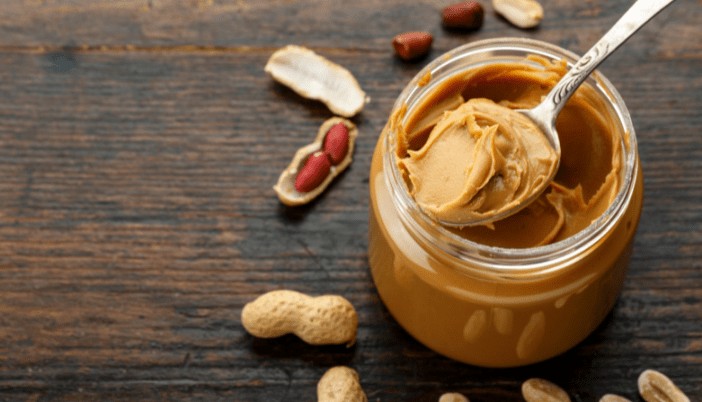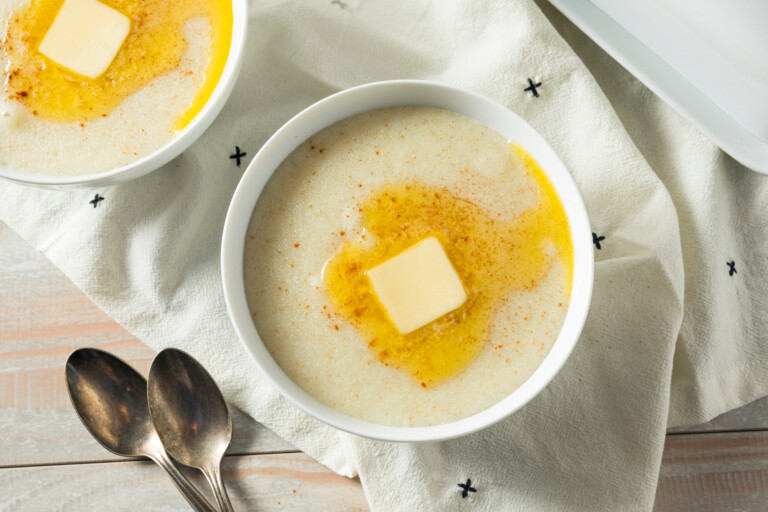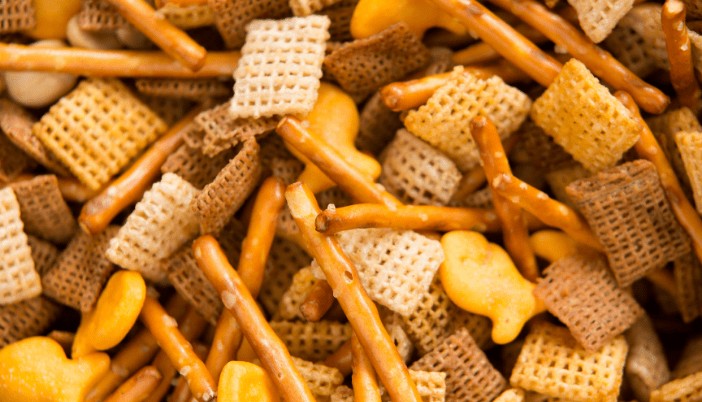Is Lard Vegan?
In the food industry, there are many different sources of fats and oils. Some are obviously not vegan friendly, but others are less clear.
Lard is an ingredient used for fat in cooking, or as “shortening” in baked goods. Due to the prevalence of vegetable-based shortenings that are unrelated to lard or butter, this can be confusing.
Lard is also less common in the modern day, so you might wonder what exactly it is when you see it in the ingredients list. So is lard vegan-friendly?
As an Amazon Associate, I earn from qualifying purchases. The links below may be affiliate links. Please read my disclosure policy for more information.
What is lard?
Lard is a fat used in cooking and baking, often used in place of oil, butter or vegetable shortening. It has an opaque, milky-white color, and has a solid, waxy consistency which can vary to soft or gelatinous.
It’s a common cooking ingredient, and will often be found in baking, particularly traditional baking.
Thus, if you’re following a vegan diet, it’s important to check the ingredients in any pies or cakes you eat. Short crust can contain lard.
It’s a popular ingredient in baking because it evaporates and steams the crust as it cooks, and it has a high smoke point. It also has large fat crystals.
In the modern day, it’s easy to use vegan alternatives to almost any ingredient. But is lard vegan?
Read on to find out why lard isn’t suitable for vegans, why, and what else you can cook with.
Why isn’t lard vegan?
Not all vegans follow a vegan diet for the same reasons. Some people following a vegan diet do it because they are anti-animal abuse, a common problem in the meat and dairy industries, or they are pro-animal rights.
Other vegans might follow the diet because animal products often have a large carbon footprint and negative impact on the environment, and some people follow a vegan diet because meat and dairy are reported to have a negative impact on health. So why exactly is lard not a vegan ingredient?
Lard isn’t vegan because it is derived from the fatty tissue of pigs. All animal byproducts are off-limits for vegans. So what about vegetarians?
Is lard vegetarian?
Lard is not only non-vegan, but it is also non-vegetarian.
This is because lard is pork fat, cut from the back and kidneys of pigs. In sheep, similar substances are known as tallow, and the name and definition can vary depending on where the lard was obtained on the animal.
Because lard is directly obtained from animal tissue, and the animal must be killed to obtain it, lard is strictly non-vegetarian.
How is lard made?
Lard is removed from the pig, generally by cutting it off of the animal or removing the organ the lard is to be obtained from. This is done after the pig is killed, and different parts of the animal’s fat will obtain different qualities of fat.
The fat may or may not be rendered to remove extra-fat material before sale.
Is lard unethical?
Lard is obtained from a pig after they have been slaughtered. Many vegans object to the slaughter of animals altogether, especially when cruelty free alternatives like plant-based foods exist.
World-wide, the pork industry slaughters millions of pigs each year, with over 70% of these pigs raised indoors in over-crowded spaces. These pigs do not have access to outdoors and are deprived of natural sunlight and movement.
The pigs being deprived of movement also helps the pigs fatten up for lard. This is in addition to being given fattening feed.
The female pigs are cyclically impregnated to maximize revenue, and the litters will be taken away from them immediately. This causes visible and audible distress to the mother pig and to the piglets as well, which vegans argue constitutes cruelty.
Because they are in a stressful and over-crowded environment, pigs in factory forms often exhibit violence and aggression. To prevent pigs from killing one another, the handlers cut off the teeth and tails of the pigs, and the male pigs are castrated.
This allows them to continually breed pigs indoors, for maximum profit.
Although in the wild a pig can live up to 15 years, they are generally slaughtered at just six months old. Slaughterhouses try to kill as many pigs as fast as possible, so accidents happen often and inhumane deaths for the pigs result.
Because lard is a by-product of this process, paying money for lard will return revenue to this business. These practices are done to maximize revenue, so many vegans agree that it is unethical to pay money towards businesses that sell animal by-products at all.
Is lard bad for the environment?
Pig farms, particularly factory farms, produce a great deal of pig feces as waste. Many farms then funnel the feces into rivers and local water sources, killing existing ecosystems.
In particular, the ammonia found in pig urine is highly toxic to humans. People who live near pig farms are likely to suffer health problems related to this.
Is lard bad for you?
Lard contains cholesterol, which in excess can be negative to health, potentially increasing chances of obesity and diabetes. Industrial lard, designed to last for a long time, is often hydrogenated.
Hydrogenated fats are infused by blasting the fat with hydrogen. While this elongates their shelf-life, hydrogenated fats are associated with higher low-density lipoprotein cholesterol, or LDL cholesterol.
This cholesterol is often colloquially referred to as the “bad cholesterol”, as it is associated with diabetes and heart disease.
Lard also contains saturated fats, which can lower your high-density lipoprotein cholesterol, or HDL cholesterol.
Is lard dairy free?
Lard is technically dairy free. This is because although lard can appear visually similar to butter, it is obtained by rendering animal fat.
Unlike butter, lard cannot be eaten by vegetarians, as it is obtained by killing pigs. This is in contrast to milk and butter, which are obtained from living cows.
Neither can be eaten by vegans.
Is lard an animal product?
Lard is an animal product, whether it is refined from the kidneys of a pig or the rind. This is because pigs have to be killed for lard to be obtained, and there is no non-lethal manner for it to be acquired.
Try not to be fooled by smell or taste. Well-refined lard, like leaf lard, can taste more neutral than cheaper lards that keep a pork aftertaste.
Lard is always derived from animals, and it is never vegan.
Is there a vegetarian substitute for lard?
Lard can seem difficult to substitute, because unlike butter or oil, lard is semi-solid at room temperature. This means that the large fat crystals evaporate in a particular fashion in food, creating particularly flaky crusts.
However, vegetable shortening is a great option if you need to replace lard. The texture will be less flaky, but it maintains a semi-solid state and it has a taste that is more like butter, allowing it to be used in a wider variety of recipes.
Lard can often maintain a pork-like taste, making it taste quite strange in certain sweet dishes.
Vegan vs. vegetarian
Vegans follow a strict diet that consumes no products deriving from animals at all. This includes items like cheese, milk, and in some cases honey.
Vegetarians avoid products that stem directly from the slaughter of animals, as opposed to their byproducts. This means vegetarians still consume milk and cheese but avoid meats and seafood.
Is rendered lard vegan?
Rendering is when the fatty tissue is cooked slowly to remove the meat and traces of skin or rind, leaving only the lard so it can be totally separated from the tissue. The process of rendering is used to separate the two.
The fatty tissue of a pig, from varying places on the animal, is cooked slowly until the fat has melted whereby it can be separated from the meat.
Any water tends to cook-off during the process leaving only the fat that can be used when cooled, like lard.
Rendering lard does not make it more vegan or remove non-vegan elements, so it is not vegan. However, it has a less strong pork flavor.
Try not to judge it by this element, and always check if what you’re using is animal lard. Sometimes vegetable shortening is called vegetable lard, but these are very different products.
Is processed lard vegan?
Processed lard is when lard is filtered and also clarified to remove the pork flavor and any remaining impurities. Clarification involves bleaching and hydrogenating the lard, removing the pork flavor.
The hydrogenation means that it will stay solid at room temperature. It is still not vegan.
Is leaf lard vegan?
Leaf lard is a more expensive variety of lard, because it is obtained from the fatty tummy and kidney of pigs. This means it has a creamier and smoother texture than more lard, and it has a neutral flavor with no pork aftertaste at all.
It is still not vegan, so be sure to check what you’re using if you’re cooking with shortening or lards.
Are foods with lard vegan?
As established, lard is not vegan. That doesn’t mean you won’t see it in typically vegan products, however.
Tallow is another word for lard, as well as dripping.
If you’re following a vegan diet, make sure to take care when eating foods such as French fries, refried beans, or any cake or brownie mixes you buy to ensure they don’t contain lard.
Lard vs. shortening
Shortening and lard can appear visually similar. But they are both very different, in how their made and their taste as well.
Lard is a traditional product that has been in use for hundreds of years. It’s made from fat obtained from slaughtered animals, mostly pigs, and is solid when chilled into an opaque substance.
Taste varies, and it can be strongly pork-flavored or not flavored at all. It is also notable for being associated with higher bad cholesterol and heart disease.
Shortening can refer to any solid fat, which is why it’s important to be careful when shopping. However, it’s mostly used to refer to vegetable shortening in the modern day.
Vegetable shortening is made by hydrogenating palm or soybean oil.
Hydrogenation, which is also an unhealthy process, blasts fats with hydrogen, meaning that they stay solid at room temperature. For that reason, it’s important to note shortening is not necessarily healthier than lard.
Are there vegan friendly lard substitutes?
Thankfully, lard is very easily substituted. As a fatty element to cooking, it has a certain texture it gives to food, which is why it is preferred and sought out for traditional baking.
It also has a high smoke point, meaning certain oils and fats won’t be able to replicate it. So what can you substitute instead of lard?
Vegetable shortening is likely to be the best substitute for lard available. It contains similar fats and cholesterols, without any animal products or byproducts.
Vegetable shortening also has a similarly high smoke point. Shortening does also contain hydrogenated fats, which boost bad cholesterol.
Coconut oil is also a good candidate. It is solid at room temperature like lard, and it has a high smoke-point, making it ideal for frying.
Unlike vegetable shortening, coconut oil is not hydrogenated, and is a totally natural oil. It contains saturated fats however, but these raise both good and bad cholesterol equally.
It should be used in moderation. Coconut oil can leave a distinctively sweet flavor, so try to use it with suitable food.
Olive oil can make a good substitute for lard in baking, but for frying it has a lower smoke-point and is therefore not suitable. It also has a distinctive flavor, so it may not be suitable for certain dishes, particularly sweet ones.
Since lard has high-fat content, try to substitute wisely. Different substitutions can make big differences to the product, particularly in baking.
Can I use shortening instead of lard?
Shortening and lard are compositionally very similar.
They are both semi-solid at room temperature, and they can be switched in recipes very easily. The recipe will generally be 1:1 if you want to replace lard with shortening.
Vegetable shortening has the added benefit of no lingering pork flavor, meaning you can use vegetable shortening in a wider variety of recipes.
What is vegetable lard?
Vegetable lard is another name for vegetable shortening. It has a light, imperceptible flavor, and is good for baking and greasing pans.
Is vegetable lard good for you?
Vegetable lard, or vegetable shortening, is produced from hydrogenated vegetable oils. Hydrogenated fats boost bad cholesterol, and like with any fat, should not be consumed in excess.
Excessive consumption of any fats can lead to heart disease, weight gain and a variety of other problems stemming from these.
Consume vegetable lard in moderation.
Is hydrogenated fat vegan?
As hydrogenation is a process, vegan products can be produced using hydrogenation, such as vegetable shortening. Hydrogenation ensures it stays solid at room temperature and can change the texture of products it is used in.
Lard is not usable by vegetarians or vegans, so hydrogenated fats can make a good replacement for pie crusts.








